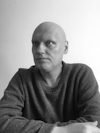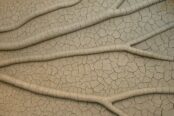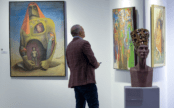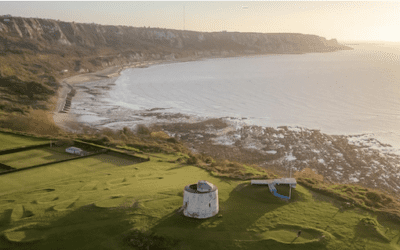[dropcap style=”font-size:100px; color:#992211;”]T[/dropcap]here is a nightmare of globalisation described in the pioneering film Network (1976).
It’s the less famous speech of Arthur Jenson, a shadowy capitalist titan who, angry with Beale’s firebrand rabble rousing in his business affairs, attempts to convince him of a new world view:
“You have meddled with the primary forces of nature, Mr Beale, and I won’t have it! Is that clear?
You think you merely stopped a business deal. That is not the case. The Arabs have taken billions of dollars out of this country, and now they must put it back! It is ebb and flow, tide and gravity. It is ecological balance.
You are an old man who thinks in terms of nations and peoples. There are no nations. There are no peoples. There are no Russians. There are no Arabs. There are no Third Worlds. There is no West. There is only one holistic system of systems. One vast and immanee, interwoven, interacting, multi-varied, multi-national dominion of dollars. Petro-dollars, electro-dollars, multi-dollars, reichmarks, rands, roubles, pounds and shekels.
It is the international system of currency which determines the totality of life on this planet. That is the natural order of things today. That is the atomic, and sub-atomic and galactic structure of things today.
And YOU have meddled with the primal forces of nature. And you will atone.
Am I getting through to you, Mr Beale?
You get up on your little twenty-one inch screen and howl about America and democracy. There is no America. There is no democracy. There is only IBM and ITT and AT&T, and DuPont, Dow, Union Carbide and Exxon. Those are the nations of the world today.
What do you think the Russians talk about in their Councils of State? Karl Marx? They get out their linear programming charts, statistical decision theories, mini-max solutions, and compute the price-cost probabilities of their transactions and investments, just like we do.
We no longer live in a world of nations and ideologies, Mr Beale. The world is a college of corporations, inexorably determined by the immutable bye-laws of of business. The world is a business, Mr Beale. It has been since man crawled out of the slime.
And our children will live, Mr Beale, to see that … perfect … world in which there is no war nor famine, oppression or brutality. One vast and ecumenical holding company for whom all men will work to serve a common profit. In which all men will hold a share of stock.
All necessities provided. All anxieties tranquilized. All boredom amused,”
– Arthur Jensen (Ned Beatty) Network (1976) – Peter Finch
This is surely a nightmare for anyone who wishes to preserve national identity in this world. British values dissolve along with all others, Jensen’s children are the children of a grey world where problems and tensions are eliminated along with any great passions. It is Nietzsche’s fear of the ‘Last man’ made real and perfected,
The earth has become small, and on it hops the last man, who makes everything small. His race is as ineradicable as the flea; the last man lives longest.
‘We have invented happiness,’say the last men, and they blink. They have left the regions where it was hard to live, for one needs warmth. One still loves one’s neighbour and rubs against him, for one needs warmth….
One still works, for work is a form of entertainment. But one is careful lest the entertainment be too harrowing. One no longer becomes poor or rich: both require too much exertion. Who still wants to rule? Who obey? Both require too much exertion.
No shepherd and one herd! Everybody wants the same, everybody is the same: whoever feels different goes voluntarily into a madhouse.
‘Formerly, all the world was mad,’ say the most refined, and they blink…
One has one’s little pleasure for the day and one’s little pleasure for the night: but one has a regard for health.
‘We have invented happiness,’ say the last men, and they blink.”
– Friedrich Nietzsche, Thus spoke Zarathustra, 1883
Guarding against this threat is not a matter of building walls and closing borders. The ideas which seemed academic and thought provoking in Network found body in the 1980s and the threat to our values came not from a foreigner but our own prime minister, who proclaimed, ‘there is no such thing as society!’. Thus, Thatcher as an acolyte of Jensen’s capitalist cosmology,
“I think we’ve been through a period where too many people have been given to understand that if they have a problem, it’s the government’s job to cope with it. ‘I have a problem, I’ll get a grant.’ ‘I’m homeless, the government must house me.’ They’re casting their problem on society. And, you know, there is no such thing as society,”
– Prime Minister Margaret Thatcher, talking to Women’s Own magazine, October 31st, 1987
This is always perceived from the perspective of the weary rulers who are put upon, does it count the other way around?
I want my drains cleaned, I’ll get a worker. I want my children educated or my liver treated or my bins cleaned, sorry Maggie, there’s no such thing as society. We are all tired of minimum wage and X-Factor, we’re busy driving around the midlands and killing each other a la Mad Max. No, in fact there is such a thing as society, and we need each other.
We do live in society! It is a bastardised and bloody society, the history of which is drenched in as much blood as it is exalted by great achievements, but it is our heritage as Europeans. We must live in a world where Jews can love Wagner, where Englishmen can admire Napoleon and read continental philosophy, and where we can all take a piece of the civilising values (the commons) of literature and laws of both the learned men of ancient Greece and the Barbarians who sacked Rome. At this point do not all these histories belong to us? Not legitimately claimed by any nation-state, but by all Europeans (including brand new Europeans and the colonial peoples who came or were brought here, who are also authentically European).
Do we really want to step backwards into a less rich and less varied history where we only stick to our own?
Part one of this essay on the Brexit debate can be read here.

Michael Eden is a visual artist, researcher and writer at the University of Arts London exploring relationships between monstrosity, subjectivity and landscape representation.

















